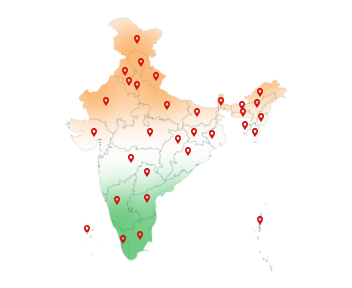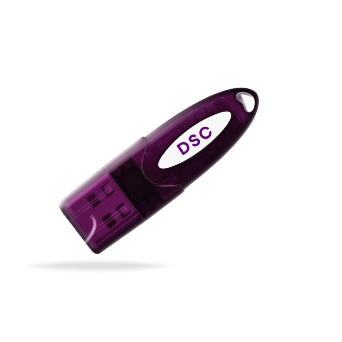18-Sep-2025
How to Apply for Certificate of Origin | DGFT DSC
Let's be honest—exporting goods isn't as simple as shipping a package. Deadlines, forms, licenses… one small mistake, and your shipment can be delayed or even rejected. A missing or incorrect Certificate of Origin (CoO) is one of the most common culprits, causing headaches for exporters every year.
So one thing becomes clear: One missing paper can halt your international shipment. Don't let it be your Certificate of Origin (CoO). It's better to keep your CoO ready as a responsible exporter.
And for that, you need a Digital Signature Certificate. With a DGFT DSC, applying for a Certificate of Origin is now faster, simpler, and completely secure.
Want to buy DGFT Digital Signature? Buy Capricorn DSC right now!
What is a Certificate of Origin?
Certificate of Origin: Unlocking Smooth International Trade
A Certificate of Origin (CoO) is a crucial document in international trade that certifies the country where a product was manufactured or produced. Customs authorities, importers, and governments rely on it to verify the origin of goods, determine tariffs, and ensure compliance with trade regulations.
In simple terms, a CoO is like a passport for your shipment—it proves where your goods come from and helps your export move smoothly across borders. Without it, shipments can face delays, extra charges, or even rejection by customs.
You may wonder who issues it? In India, the Certificate of Origin is issued by:
- Chambers of Commerce
- Export Promotion Councils
Types of Certificate of Origin
Exporters need to know that there are two main types of Certificates of Origin. Each of these serves a specific purpose:
1. Preferential Certificate of Origin
2. Non-Preferential Certificate of Origin
Preferential Certificate of Origin (P-CoO)
- Issued for goods that qualify under a trade agreement between countries (like Free Trade Agreements or Regional Trade Agreements).
- Helps exporters avail reduced or zero customs duties in the importing country.
- Required when the importer wants to claim preferential tariff benefits.
Non-Preferential Certificate of Origin (NP-CoO)
- Used for goods that do not fall under any preferential trade agreement.
- Confirms the origin of goods for customs purposes but does not provide tariff benefits.
- Commonly required for standard exports, where the importing country simply needs to verify the source of the products.
Why Do You Need a Certificate of Origin?
Here's why a certificate of origin is needed in international trade:
1. Customs Clearance – Most importing countries require a CoO to verify the origin of goods before releasing shipments.
2. Preferential Tariffs – With a Preferential CoO (P-CoO), exporters can help importers claim reduced or zero customs duties under trade agreements.
3. Credibility with Buyers – A CoO reassures foreign buyers about the authenticity and origin of your products.
4. Legal Compliance – Many countries mandate a CoO for certain goods; without it, shipments may face delays, fines, or rejection.
5. Dispute Prevention – Provides proof of origin in case of any trade disputes or claims with importers or authorities.
Who Needs a Certificate of Origin?
A Certificate of Origin (CoO) is primarily the responsibility of the exporter. As an exporter, you need to prove the origin of your goods through the CoO, ensuring that your shipment complies with international trade regulations and reaches the importing country without delays.
Apart from the exporter, this certificate is also used by the importer to avail benefits such as preferential tariffs during customs clearance and to verify the authenticity of the shipment.
What Kind of Products Need a Certificate of Origin?
1. Agricultural and Food Products
2. Textiles and Apparel
3. Chemicals and Pharmaceuticals
4. Machinery and Equipment
5. Metals and Minerals
6. Handicrafts and Artisan Products
7. High-Value or Bulk Shipments
Do All Countries Require a Certificate of Origin for Trade?
Not all countries mandate a Certificate of Origin (CoO) for imported goods. The requirement depends on customs regulations, trade agreements, and the type of products being imported.
1. Countries under Free Trade Agreements (FTAs) or Regional Trade Agreements (RTAs) often require a Preferential CoO (P-CoO) to allow importers to claim reduced or zero customs duties.
2. Some countries require CoO for specific goods like machinery, chemicals, textiles, or high-value shipments, even without preferential treatment.
3. Other countries may not require a CoO at all, especially for low-value or non-regulated products.
Certificate of Origin Cost
The Certificate of Origin cost depends on the type of CoO you apply for. A Preferential Certificate of Origin (P-CoO) may have a different fee compared to a Non-Preferential CoO (NP-CoO).
Also, Some exporters request multiple stamped copies for customs and buyers, which may increase the fee for Certificate of Origin from Chamber of Commerce.
Prerequisites for Certificate of Origin DGFT
1. Commercial Invoice – Details of the goods, quantity, and value.
2. CoO Application Form – Filled application for the Certificate of Origin.
3. Packing List – Information on packaging, weight, and dimensions.
4. Notarized Affidavit – Declaration of the origin of goods, if required.
5. Export License – Valid export license for exporting goods.
6. Digital Signature Certificate (DSC) – Required for online applications via the DGFT portal.
Having all these documents ready ensures a smooth and hassle-free Certificate of Origin for export application process.
Wondering where you can get a Digital Signature Certificate for DGFT? You must get it from a trusted DSC provider in India Capricorn CA can be YOUR best choice for a DGFT DSC.
How to Apply for Certificate of Origin India?
Here is a Step-by-Step Process on how to get Certificate of Origin for export:
Step 1: Register on the eCoO Portal
- Visit the Trade Connect portal (Certificate of Origin login)
- Log in using your IEC number and DGFT credentials.
- Ensure your Digital Signature Certificate (DSC) is registered for authentication.
Note: Important Update for Exporters
- Submission of new Preferential CoO applications on the old platform has been discontinued from 16th January 2025, 10:00 PM. So the filing on the new portal has started form 17th January 2025.
- Exporters must switch to the eCoO 2.0 system to avoid disruptions in Certificate of Origin filing.
Step 2: Choose the Type of CoO
- Select whether you need a Preferential CoO (P-CoO) or a Non-Preferential CoO (NP-CoO).
Step 3: Fill in the Online Application Form
- Enter exporter, importer, and product details.
Step 4: Upload Supporting Documents
- Attach scanned copies of the required documents.
Step 5: Pay the Application Fee
- Submit the required fee online through the integrated payment gateway.
Step 6: Digital Signing and Submission
- Use your DSC to digitally sign the application and submit it
Step 7: Approval and Issuance
- Once verified, the Certificate of Origin is issued electronically.
- Exporters can download and share the certificate authorities for clearance.
Benefits of Certificate of Origin
A Certificate of Origin (CoO) plays a crucial role in international trade by making the export-import process smoother and more reliable. Here are the key benefits:
Ensures Smooth Customs Clearance – Shipments are processed faster at borders when supported by a valid CoO.
Proof of Authenticity – Establishes the country of origin of goods, boosting credibility in international markets.
Access to Trade Benefits – Under Free Trade Agreements (FTAs), a Preferential CoO allows importers to claim reduced or zero customs duties.
Compliance with Global Trade Regulations – Many countries make CoO mandatory, and having it prevents delays, penalties, or shipment rejection.
Facilitates Business Expansion – With verified origin documents, exporters can confidently enter new markets and strengthen buyer trust.
These benefits make it even clearer that a Certificate of Origin is a must for exporters. So fulfil all pre required things like DGFT DSC
Still waiting to get your DGFT Digital Signature? Stop waiting time! Buy Capricorn Digital Signature Certificate today!
Conclusion
So now you know what is Certificate of Origin DGFT, Benefits, why you need it, how to get Certificate of Origin for export and much more. You can easily apply for Certificate of Origin in India through the DGFT's eCoO 2.0 portal.
Many exporters wonder about the Certificate of Origin cost—fees may vary depending on the product, destination country, and issuing authority. The entire process is now digital. So don't need to kook for any Certificate of Origin PDF as this CoO guide is enough for you to easily apply for Certificate of Origin India.


